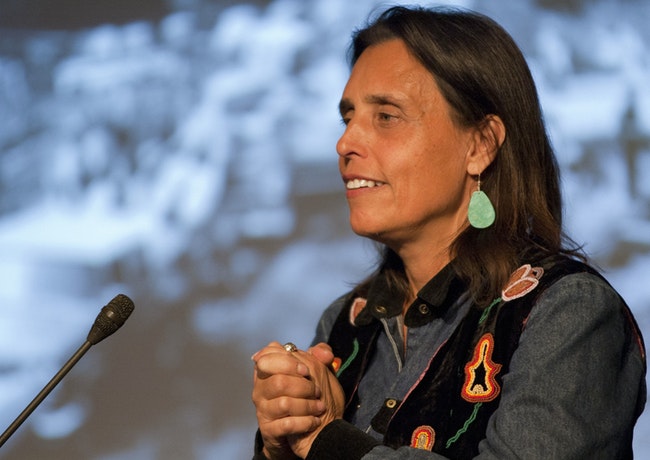 Winona LaDuke (Courtesy photo)
Winona LaDuke (Courtesy photo)
One of the most influential environmental activists in the world today, Winona LaDuke, will discuss Indigenous responses to climate change in the 23rd Annual Salem Peace lecture Nov. 10.
LaDuke is a Harvard and Antioch University graduate, a two-time running mate of Green Party Presidential candidate Ralph Nader and a world leader on issues such as climate change and Indigenous and human rights. She is the author of five books on Native American and environmental issues.
The Peace Lecture Series is the result of longstanding cooperation between several Salem organizations, each individually devoted to a world that is peaceful and just. It began in 1990 through the joint efforts of Salem Peace Plaza, Inc, the Salem chapter of United Nations Association, Physicians for Social Responsibility, the Willamette University Educational Programs Committee and the Willamette University Office of the Chaplains.
The series aims to bring Salem thought-provoking speakers who can explore pathways to justice, peace, and peace – both in the immediate community and throughout the world.
“We believe that in a democracy, the public needs to be well-informed about critical topics that affect them,” said Peter Bergel, member of the selection committee. “Our lectures seek to bring both information and inspiration to our participants.”
When asked how the issue of climate change reflects the values of the series, committee member Alice Phelan said, “All of us who wish to see a robust future for humankind are aware that the human-caused climate changes we’re witnessing today have broad implications for peace.”
Those issues include, Phelan said, “competition for scarce water and food, the creation of refugees as parts of the earth become unlivable, and tensions between activities that exacerbate global warming and the efforts to keep our planet habitable.”
LaDuke’s life and activism have addressed such concerns for 40 years. She currently lives and works on the White Earth Reservation in northern Minnesota, an Anishinaabe – or Chippewa – reservation. There, she founded the White Earth Land Recovery Project, a reservation-based nonprofit that has already implemented culturally based sustainable strategies, renewable energy and food systems. The project also works on tribal land claims and preservation.
“My idea of the next economy and making America great again,” she told an audience at the HUM-Robeson Center at Penn State in April 2019, “is tremendous biodiversity and agriculture, and it needs to be local. This is what a sustainable economy will look like.” LaDuke’s own life reflects this vision by farming heritage vegetables and industrial hemp.
Concerned about the deadly link between greenhouse gases and a warming planet, LaDuke was on the frontlines of the prolonged protests against the Dakota Access Pipeline.
For years she, through Honor the Earth, an organization she co-founded in the 1990s, has also prominently resisted Enbridge’s Line 3 pipeline, recently completed, which will carry more carbon-intensive tar sands oil between Alberta, Canada, through Minnesota to the point of Lake Superior in Wisconsin. Among LaDuke’s many objections to the line, she has said, is that it is still uninsured, the way it will threaten sacred wild rice watersheds in Minnesota and the fact it will double Minnesota’s greenhouse gas emissions.
LaDuke’s work on these issues reflects the thinking of the Salem Peace Lecture Committee and its concept of peace, said Bergel. Peace, he said, “encompasses peace between individuals, peace between groups of people/nations, and peace with the earth. Traditional Native American values accord especially well with the latter.”
Bergel added that some of the lecture’s attendees are students. “As they prepare for life in a world in which climate change will play an ever-increasing role, learning about Native approaches to this problem is important,” he said.
Further, Bergel noted, “Winona’s history goes far beyond talking the talk. As a dedicated water protector, she has been on the front lines of walking the walk as well. We can all learn from and be inspired by her example.”
If you go
23rd Annual Salem Peace Lecture, with Winona LaDuke
“Indigenous Strategies to Address Climate Change”
Wednesday November 10, 2021, 6:30 p.m.
Delivered by Zoom; to receive a link send your email address to Peter Bergel at [email protected]
Free and open to the public.
Writer Helen Caswell can be reached at [email protected].
Story idea? Tip? Contact Salem Reporter by email: [email protected].
JUST THE FACTS, FOR SALEM – We report on your community with care and depth, fairness and accuracy. Get local news that matters to you. Subscribe to Salem Reporter starting at $5 a month. Click I want to subscribe!









